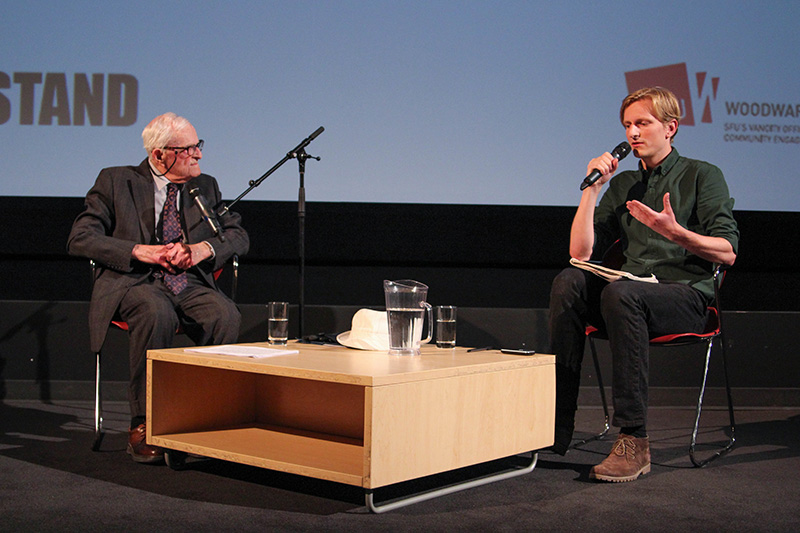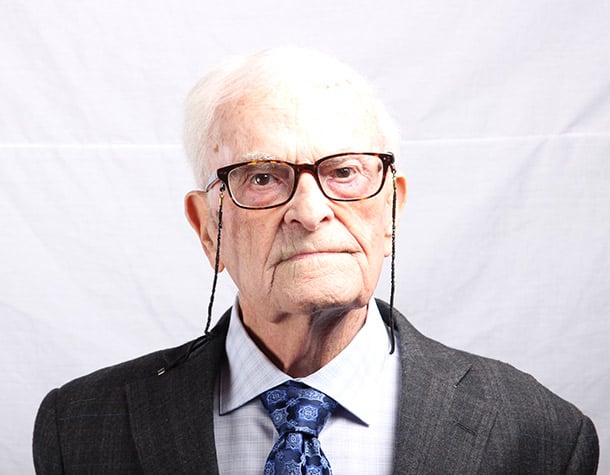As Harry Smith fought for his life in an Ontario hospital, online tributes poured in for the 95-year-old who battled against policies that sow divisive “cruelty,” and for a social safety net rewoven.
“Please pass on my best to Harry. We need him to get well soon,” U.K. Labour leader Jeremy Corbyn said on Twitter. The actress Mia Farrow tweeted that “He has been an inspiration. I’m so very grateful to him.” Socialist author and commentator Owen Jones said “you are one of the most inspirational, amazing people I’ve ever had the privilege, the honour, to spend time with.” Prime Minister Justin Trudeau tweeted “Harry’s journey and courage have inspired so much love and kindness on [Twitter], and in the real world too.”
Told, in his hospital bed, of the support flooding in, Smith responded through his son John on Twitter: “Tell them, I love each of them so much." Harry Smith passed away early this morning.
Smith was a contributor to The Tyee. Three or so years ago, I interviewed him on stage in Vancouver for a Tyee event called “The Canada we’re losing, and how to get it back.” With Smith in critical condition at Ontario’s Belleville General Hospital after a fall last week, I decided to revisit his Tyee stories and the presentation he and I participated in at SFU Woodwards.
Smith’s main focus at the time was urging people to vote Conservative Prime Minister Stephen Harper out of office — he had earlier described Harper as “the worst prime minister that ever existed.” But as I reread Smith’s stories back to 2015, I was amazed at how relevant they still feel.
‘I have seen this country... slip back’
Smith had grown up poor in Yorkshire during the 1920s and ‘30s, his England and the West roiled by vast disparities in wealth. Nearly a century later, he sensed those conditions returning. “Since the start of the 21st century, I have seen this country and the rest of the Western world slip back to a society that reminds me of my boyhood,” he said on stage in Vancouver. “Today is starting to have that same edge, that same cruelty and the same divisions of those that have and those that have not, which polarized the 1920s and 1930s.”
Three years ago that felt a bit to me like hyperbole. But in the wake of Brexit, the election of Donald Trump and the leftwing backlash of democratic socialists like Corbyn and Bernie Sanders, Smith’s warning rings prescient.
Smith first came to The Tyee’s attention in March 2015. He was already well-known in the U.K. by then, owing to a series of op-ed pieces in the Guardian and his memoir titled Harry’s Last Stand. After an emotional speech in defence of public health care at a 2014 Labour Party debate, which resulted in a standing ovation, he set off on a 30-city speaking tour to rally voters against the Conservative government of David Cameron.
Smith, who’d moved to Belleville, Ontario in the 1950s, said that he was coming for Harper next. “Since Harper has come into power, everything has gone downhill. He has one consideration, and that is to let the rich get richer and the poor fend for themselves,” he told The Tyee’s former national reporter Jeremy Nuttall.
After Nuttall’s article ran, Smith continued to appear on The Tyee. In an op-ed he wrote in August 2015, Smith attacked Harper for involving Canada in the U.S.-led war against terrorism while shutting down Veterans Affairs offices and supporting policies that pushed many veterans into poverty. “Over the course of this election, many will hear Stephen Harper talk about patriotism, the heroes of the Canadian military, and how terrorism threatens the freedoms of ordinary citizens,” wrote Smith, who fought in the Second World War. “I won’t listen, because I will be thinking about how the Canadian veterans of his wars are now ignored by his government.”
Those who cause, then exploit anxiety
In October 2015, Smith again took aim at Harper’s government. In the lead-up to the federal election, the Conservatives hired a campaign strategist known for exploiting racial resentments, and promised to set up a police hotline for reporting “barbaric cultural practices,” which was widely seen as an attack on Muslims. Smith accused Harper of “employing racial and religious fear to castigate a specific group of Canadians as the enemy within to win an election.”
He went on, “Voters must be mindful Canada could be transformed from a tolerant, forward-thinking nation to a regressive country — where bigotry darkens the landscape like an uncontrollable forest fire. All it takes is an electorate that embraces, from either indifference or fear, the politics of racial and religious division.” (Sadly, that was the reality that a coming wave of far-right populist leaders across the world would soon exploit.)

I spoke with Smith several times in this period. Over the phone one afternoon he described a vicious cycle where right-wing leaders like Harper put in place policies that heighten inequality, and then benefit politically from the anxiety and cynicism this inequality causes.
Smith said it was possible to break the cycle, and to “change Canada for the better,” but for that to happen “we have to get the citizens of Canada up off their asses.” He explained, “If we ignore our democratic duty to vote, we will be entering a dark age.” Canadians took that advice seriously in 2015. A surge of voters, especially millennials, turned out on election day and voted Harper out.
As Smith knew all too well, this was only one battle in a much larger war against inequality. When we appeared on stage together in Vancouver, Smith described a harrowing vision of our present and where it could lead, a society where housing and other necessities are controlled by hedge-fund managers, large government cutbacks strand our most vulnerable citizens and the gap between rich and poor quickly chisels away at democracy.
“It was those divisions in Europe and North America along with extreme poverty, perverted ideologies and lack of social safety network that were contributing factors in the Second World War, the Holocaust and ultimately Europe being divided by an iron curtain for over 50 years,” Smith said.
Then came Trump
At the time I didn’t take warnings like this all that seriously. Neither, it seems, did many of our leaders. A year later, in the wake of the Brexit vote, Smith wrote on The Tyee that “tax avoidance by the one per cent and smaller social services for the 99 per cent created austerity in Britain that was hijacked by right-wing parties... who foisted all of society’s ills not on those responsible but those most vulnerable: the poor and new immigrants who were visible in their adopted communities by their ethnic differences.”
He said that this “divided the nation’s population between the emotions of hope and fear. But on June 23, fear was triumphant, and Brexit is now the waking reality that Britain and the world face.” And later that November, it was Trump.
But Smith was fundamentally an optimist. Though he began his life in a period of economic extremes, grew old in the stability of the post-war period and then at the end of his life saw those extremes return, Smith believed that no challenge was too great for a citizenry with idealism to imagine a better future and the courage to fight for it.
“They called us the greatest generation because we seemed to achieve so much,” Smith said back in 2015. “I like to think that the youth of Canada and the West can stand up and fight for their rights and I would say they have the opportunity to be the greatest generation of this century.” That is still true today. ![]()
Read more: Rights + Justice, Politics
















Tyee Commenting Guidelines
Comments that violate guidelines risk being deleted, and violations may result in a temporary or permanent user ban. Maintain the spirit of good conversation to stay in the discussion.
*Please note The Tyee is not a forum for spreading misinformation about COVID-19, denying its existence or minimizing its risk to public health.
Do:
Do not: